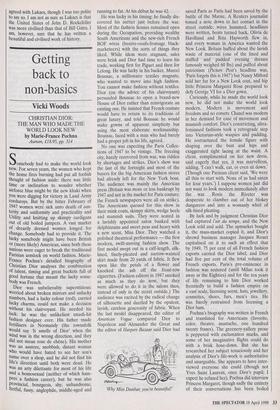The flavour of the year
William Rees-Mogg
A THREAD OF YEARS by John Lukacs Yale, £19.95, pp. 481 Occasionally one is given a book to review which one likes too well. That is always rather difficult as one tends to lose one's critical edge. For me, John Lukacs's A Thread of Years is such a book. It is a work of history written with such charm and insight that I feel the strongest possible sympathy both with the book and with the author. At least that allows me to answer the question which every reviewer ought to answer, at least by implication: 'Should one buy this book?' Yes, one should buy at least two copies, one for oneself, and one to lend to one's friends, though they will be quite unlikely to return it.
The technique John Lukacs has used is original; certainly I have never come across it before. He takes an imagined incident to illustrate the mood of each year from 1901 to 1969. The scene is usually set in America, very often in the region of Philadelphia, though sometimes elsewhere in the world, in Britain, France or Hungary. Some of the characters reappear, though many do not. Each of these scenes is followed by a conversation between the author and his other self. He discusses the United States from the point of view of a historian who is a long-established immigrant from Hungary.
I was drawn to the book partly because my mother was living in America until 1920; I have visited it almost every year since 1951, often several times. For more than half the years which are described I have my own similar episodic memory, or my mother's.
Occasionally, John Lukacs's vignettes coincide in some particular way with these episodes; more often my episodes, or my mother's memories, echo his vignette, but in a different city or in the company of different people. Indeed, some of my mother's memories were more dramatic. In 1915, she attended a New York farewell party for a theatrical friend who was returning to Britain with her mother and her young son. The trunks were all packed, the cab was ordered. At the party the old mother became so blind drunk that they had to send the cab away. The ship was the Lusitania.
In his 1915 anecdote, Lukacs has the Austrian military attaché on holiday at Cape May. 'July 1915 was three months after the sinking of the Lusitania. The slow turning of the course of the American ship of state slightly but perceptibly toward the Allies had begun.' The imagining of the linkage between a particular event and world history makes one think of other similar events which share the mood of a particular historic moment.
Putzi Hanfstaengl, Hitler's foreign press spokesman in the 1920s, also met my mother in New York in 1915; he was working for his family firm of Munich art dealers. Both my mother and Hitler came to dislike him. He tried to persuade my mother that German nationalism was right, and was bound to win the war; she argued the British case hotly, coming as she did from a family of anglophile Irish Americans. Hanfstaengl does not make his appearance in A Thread of Years, but the family business in Munich does. It is visited by a Catholic priest from Philadelphia looking for a suitable religious painting for his church. Incidentally, Lukacs underestimates Irish- American sympathy for Britain in the first world war.
Lukacs asks the question 'What has happened to the United States in the 20th century?' His answer is conservative and nostalgic, though he is no neo-Conservative and much prefers Franklin Roosevelt to Reagan. 'During the Eisenhower decade, the 1950s, civilised life in America began to come apart; the surface and morals were cracking, even though the public evidences of these cracks did not show until the Sixties.' He does not continue the book after 1969, which was not the end of the century, but may have been the end of an epoch.
By the time he reaches 1969 he is more apocalyptic:
What I have in mind is the erosion of beliefs and of institutions and of manners and morals and habits that can no longer be restored. The pendulum never swings back.
History is not a mechanical clock . The Romans near their end, the mediaeval people near their end, knew something was happening to them, but they did not know where they were — at the end of an entire age in history.
Harold Macmillan comes into this book, as he should into any book written by a nostalgic Conservative: Around 1959 Harold Macmillan said some- thing about the relationship between the British and the Americans being like that between Greeks and Romans when the Greek language was being passed on to Rome; and with all respect to his classical education, he was wrong, that was not true enough.
That formed another of my episodes as well. I heard Macmillan make the same comparison to Ronald Reagan at a small London dinner party in the late 1970s. Reagan thought it was true; he was most impressed, but I agreed with Lukacs, though I was too polite to say so. I am not as sure as Lukacs is that the United States of John D. Rockefeller was more civilised than that of Bill Gates. I am, however, sure that he has written a beautiful and civilised work of history.



























































 Previous page
Previous page